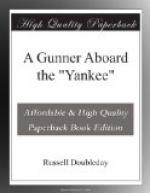These preparations had a sinister look that made us realize, if we had not done so before, that this was real war that we were about to engage in—no sham battle or manoeuvres.
The men went about their work more quietly and thoughtfully, for one and all now understood their responsibilities. If the ship made a record for herself, the crew would get a large share of the credit; and if she failed to do the work cut out for her, on the crew would be laid the blame. If the men behind the guns and the men running the engines did not do their work rapidly and well, disaster and disgrace would follow.
As we neared the scene of conflict, the discipline grew more and more strict. Before a man realized that he had done anything wrong, his name would be called by the master-at-arms and he would be hauled “up to the mast” for trial.
“You ought to see the gang up at the mast,” said “Stump,” one bright afternoon. “‘Mac’ and ‘Hod Marsh’ have gathered enough extra duty men to do all the dirty work for a month.”
“What were you doing up there?” asked a bystander.
“Why, I thought I heard my name called, and as discretion is the better part of valor, I lined up with the rest, and I was glad I did, too, for it was good sport.”
“Maybe you thought it was sport, but how about the chaps that were ‘pinched’? Who was up before the skipper, anyhow?”
“Oh, there was a big gang up there—I can’t remember them all; ’Lucky Bag Kennedy’ was there, for being late at general quarters the other day. When the captain looked at him in that fierce way of his and asked what he had to say for himself, ‘Lucky Bag’ said he didn’t realize the time. The skipper could hardly keep his face straight. ‘Four hours,’ he said, and that was all there was to it.”
“Poor ‘Lucky Bag,’” came from all sides as “Stump” paused to take breath.
“Then there was ‘Big Bill,’ the water tender,” continued “Stump.” “He was hauled up for appearing on the spar deck without a uniform. When the skipper asked him what he had to say for himself, ‘Big Bill’ cleared his throat with a woof—you know how it sounds: the ship shakes and trembles when he does it—and the ‘old man’ fairly tottered under the blast. ‘Big Bill’ explained that he could not get a uniform big enough for him, because the paymaster could not fit him out. The captain almost grinned when he heard the excuse, and ’Big Bill’—well, he enjoyed the situation, I’ll bet a month’s pay.”
There was a little pause here, and we heard a great voice rumbling from below. Then we knew that “Big Bill” was telling his intimates all about it, embellishing the story as only he could do.
We laughed sympathetically as the shouts of glee rose to our ears. We had all enjoyed his good-humored Irish wit.
“Well, who else was in trouble this afternoon, ’Stump’?” said “Mourner,” the inquisitive.
“Oh, a lot of unfortunate duffers. Several who were put on the report for being slow in lashing up their hammocks got a couple of hours extra duty each. One or two were there because they had clothes in the ’lucky bag’—they had left them round the decks somewhere, and the master-at-arms had grabbed them. The owners had to go on the report to get the clothes out. It cost them a couple of hours each.”




